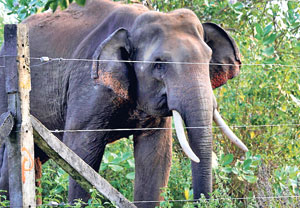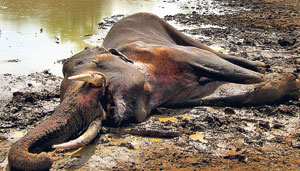What was meant to be a haven had turned into a hunting ground, with a young tusker being shot dead very close to a Wildlife office last week.
The carcass of the 15-year-old tusker, which had not even reached musth, was found on Monday, February 9, tragically inside the Uda Walawe National Park, between the 5th and 7th mileposts.
The postmortem was conducted immediately and concluded that the animal had been shot with an illegal kotana thuwakkuwa (muzzle-loader gun) a few days before, a Wildlife official confirmed to The Sunday Times.
 |
| The young tusker who was found dead on Monday |
No, was the answer, when asked whether Wildlife officials had not heard the gunshots, although the dead tusker had been found quite close to the park office at the 7th milepost. The 5th milepost also had a wildlife beat.
“The elephant may have got the wound elsewhere, but fallen at that point,” he said.
Taking into consideration the gravity of the incident, a decision has been taken to hand over the investigation to the Criminal Investigation Department, another official said, adding that this tusker, a Uda Walawe Park “resident” used to linger close to the electric fence bordering the Uda Walawe-Tanamalwila Road.
When asked why the tusker was killed, another wildlife source rejected the thinking that it may have been for its tusks because they were left intact. However, he pointed out that there were three possibilities. The place at which the tusker had fallen was along a notorious entry point of poachers to the park, who illegally and brazenly slaughter wild boar, spotted deer and wild buffalo, he said, explaining that the tusker may have, when confronted by them, turned aggressive, resulting in its killing.
The second possibility could be that some of the grama arakshaka villagers (members of the Civil Defence Force) who may be in possession of illegal guns may have got into the park for hunting, and met the elephant, which may have charged them, he said.
“This National Park has many problems with poachers and unauthorized persons because it is surrounded by 52 villages,” he pointed out.
The other could be that it may have fallen victim to ganja carriers who were attempting to cross from the park’s eastern zone to the western zone with their illegal bundles. There has been such nefarious activity within the park, he said, adding that sometimes the oru of fishermen using the reservoir have been found in places other than where they were kept.
“We are doing our best to find the culprits. We have a network of informants who are looking for clues to find out who is responsible,” he assured.
The Embilipitiya Magistrate before whom the issue had been taken up, has ordered both the Sevanagala and Uda Walawe Police to cooperate with Wildlife officials to take any suspects into custody, it is learnt.
 |
| Ravana killed at Lunugamvehera |
In August 2008, Ravana, a majestic tusker was also felled, this time in the Lunugamvehera National Park. The irony was that a year before, Ravana had been captured and forcibly removed from his birthplace, Anuradhapura, and first sent to the Uda Walawe National Park apparently for “its own good”.
But the events thereafter were a saga that ultimately led to the brutal end of this pachyderm. Ravana, which left Uda Walawe, killing a buffalo cow that was being milked in Aluthwewa village went into the hills up to Welanwita, but later returned only to leave for Handapangala, said a conservationist.
Two weeks later, Ravana got into Buttala town injuring two people and damaging vehicles, which led to the police shooting it on the leg, after which it went back to Handapangala. Treated by Wildlife officials, it stayed there for three months, but did not recover fully, was captured, treated and released into Lunugamvehera, he said.
During its eight-month stay in the Lunugamvehera National Park, Ravana frequently raided the cultivations of an NGO which had been allocated 500 acres within the park well inside the electric fence and that was where it met with its death. A number of elephants had been shot earlier too within the land inside the park given to the NGO, The Sunday Times learns.
Such elephant deaths raise numerous issues: How are elephants dying from gunshot wounds in the very place they are supposed to be “protected”? If land within a National Park is used for cultivations, shouldn’t Wildlife officials insist that the area, a temptation to elephants, be cordoned off with an electric fence, to prevent them going there?
These crucial issues need to be addressed immediately by the Department of Wild Life Conservation so as not to make National Parks a death trap for elephants.
Trackers sent home
Six trackers of the Uda Walawe National Park have been dismissed following an inquiry after they allegedly failed to attend a ceremony in Tanamalwila where Environment Minister Champika Ranawaka was present, The Sunday Times understands.
The trackers, all employed on a casual basis, had not informed anyone prior to their absence that they would not be able to attend the ceremony, a source said.
However, wildlife enthusiasts, who claimed that these trackers were very experienced “jungle men” were perturbed over the dismissal. “Conservation has been put on the back-burner, while trackers and other staff are expected to pay pooja to politicians,” said an animal rights activist, a view echoed by many.
“Sycophancy seems to be the order of the day. Who cares for the animals,” added another frequent visitor to Uda Walawe.
Uda Walawe was also the scene of controversy recently when the Department of Wildlife Conservation decided to move three babies from the Elephant Transit Home (ETH) to the Pinnawela Elephant Orphanage, to give foreigners the satisfaction of seeing small ones being bottle-fed. Pinnawela with its captive breeding programme has only babies being udder-fed by their mothers.
The babies, screaming at being separated from the others, had been forcibly trucked out from Uda Walawe amidst the angry trumpeting of the adult elephants and protests by the safari jeep owners, The Sunday Times understands, going against the very principle of setting up the ETH which is to nurture and later release abandoned babies found in the wild back to the wild. |


